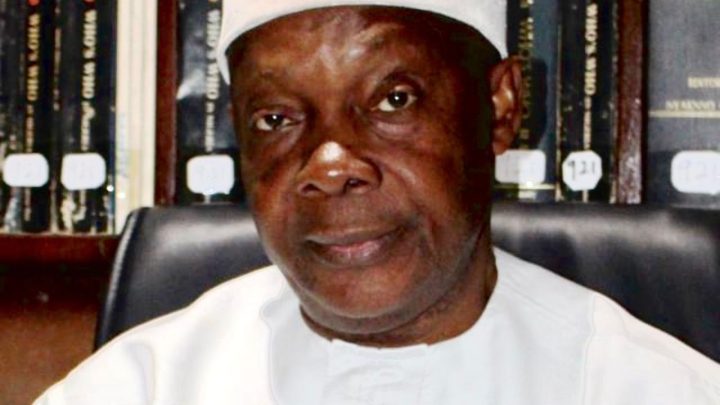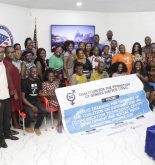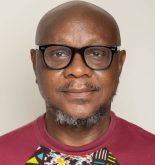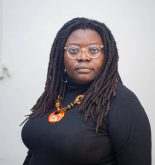By: Utibe Ukim
“Libraries store the energies that fuel imagination. They open up windows to the world and inspire us to explore and achieve and contribute to improving our quality of life. Libraries change lives for the better.” Sydney Sheldon
When I chose Mass Communications over Medicine, it was because I had been so impacted by the Nigerian Chronicle published by the then Cross River State Newspaper Corporation, Calabar that hanging a stethoscope around my neck lost its appeal.
My father loved The Chronicle too, and through him, I got ‘familiar’ with names like Nelson Etukudo, Ray Ekpu, Martins Usenekong, Antigha Bassey, Clement Ebri, Etim Amin and Signor Tofu (pen name for Elder Onofiok Ufot, multi-talented father of advertising great, Udeme Ufot, who at the time, was registrar of the University of Calabar). All these people were great writers of the time.
If that newspaper was great, it owed a lot to its library and the work of the man who started and ran it, NyaknnoAbasi Osso, Nigeria’s leading documentation specialist, whose birthday we celebrate today.
Nyaknno is the founder of Biographical Legacy and Research Foundation (BLERF). He served previously as Special Assistant on Library, Research and Documentation to President Olusegun Obasanjo. Before then, he was the Chief Librarian at Newswatch, where he published the ground -breaking Newswatch Who’s Who, a definitive biographical documentation of distinguished Nigerian achievers in all walks of life. He has been a friend and mentor for most of my life.
Through the years, Nyaknno has invested his entire life and resources collecting, assembling, and managing millions of books, journals, newspapers, magazines, and documents in a way no other Nigerian has. His home and offices in Abuja are filled with rare historical resources and reference materials fit for national archives.
BLERF has grown out of his passion to document our past through the lives and biographies of millions of Nigerian achievers so we can take lessons into our future. In a country where little value is given to proper record keeping and preservation of historical documents, and where public and private libraries have been closed down and entire stock of reference materials sold to paper recyclers, Nyaknno’s passion challenges us to rethink and take action to save what remains.
The celebrated Olusegun Obasanjo Presidential Library in Abeokuta is his brain child. Twenty-five years of his life and work are expressed in the beauty, content, and rich treasures of that Centre. It was his major preoccupation from 1988-2013.
His current project, BLERF, is a world-class media research centre Nyaknno funds from his personal resources. It boasts a rich collection of more than two million books, journals, bound volumes of newspapers, magazines, clippings, rare photographs, CDs, flash and hard drives collected since 1971.
His dream for the centre is bigger than his purse and that has significantly slowed down his speed at converting the idea to reality. BLERF’s website ( www.blerf.org) has close to 35,000 names, the largest collection of Nigerian achievers worldwide. The target is to grow the list to one million within the next five years. Such an enormous documentation project will require partnership and CSR investments to bring to life. Without strong financial partnership, this will only remain a dream.
I must have met Nyaknno around 1982 and was immediately struck by his love for everything in print. I spent what seemed like eternity in his office, receiving scant attention as he read and marked pages after pages of various local, national, and foreign publications heaped in front of him.
He would throw a question at me with his trademark laughter while his head lay buried in his work. The traffic in and out of his office was heavy. I soon found out it was production time, and many reporters, writers, and editors needed his input for the next day’s paper. I quickly figured it wasn’t a glamorous job in the newspaper publishing ecosystem and wondered why this smart and intelligent young man chose such a career path.
Nyaknno’s story is one of discovering his passion early and pursuing it with resolute devotion. It’s been a life of big dreams, lots of intellectual adventures, and an uncanny ability to strike the right connection at the right time. Call it, seizing the moment.
As an only child of parents who had buried seven children before him, childhood meant extreme protection. But when he saw other children playing in the school field across from his home, he dressed up, joined them, and earned himself a place in primary school. While the Bible and the Catholic Digest introduced him to serious reading in secondary school – where his love for history once made him to write 72 pages at a school history examination – it was his first day at a gap job while awaiting admission to study medicine at the University of Ibadan that got him hooked on books.
When he left his village, Ete in Ikot Abasi local government area of present day Akwa Ibom State to join his uncle, the late Prof Jumbo Udo at the University of Ibadan, the plan was to enroll at the College of Medicine. After writing the exam, he got a gap job at the University Library just to keep him busy. On his first day at work, he was chased home at midnight by the University Librarian. He had found his passion, and nothing was going to stand in his way. That was in 1971. Out went Medicine to the protestation of his uncle and family.
Throughout his life, providence has always positioned him in the path of opportunity. Media librarianship wasn’t something he imagined when he left Ibadan to join the newly established University of Nigeria, Calabar Campus. A chance meeting with Ray Ekpu at the then Cross River State Library, Calabar did it for him. An introduction and candid opinion that Ray’s writings could benefit from in-depth research earned Nyaknno the job of setting up and running the library at the Nigerian Chronicle. Ray would later introduce Nyaknno to Dele Giwa in 1980.
There’s an interesting story about how Nyaknno joined Newswatch. Giwa, in the company of the late Chief Ime Umanah, had arrived at his home at lunchtime one Sunday in July 1984. No pleasantries, just a simple instruction from the man he so admired, “Get dressed immediately. We are going to Lagos to start a magazine called Newswatch.” A few hours later, the trio were on board a Nigerian Airways flight to Lagos. Newswatch found its engine room. Nyaknno got himself a playing field that came to define his career trajectory.
At Newswatch, Nyaknno built a rich library that powered the intense editorial requirement of the news weekly. If you ever read and loved any editorial work in the magazine, his fingerprints were all over it. When reporters and editors needed information on anything under the sun, they went to Nyaknno. He would deliver within minutes.
In those days, without computers and the internet, Nyaknno was the search engine that powered search, quality content, and the award-winning journalism Newswatch came to be known for. How he did it so well can only be summed up in the inspiration he drew from a meeting and a handshake he had with Neil Armstrong, the first man to walk on the moon: Lasting legacies are built by doing what no one else has done before.
I visited him at work and at home, a short walk from Newswatch, after my NYSC. I couldn’t spot the difference. Every space at home was taken up by books, just like the office. It has remained that way till today no matter where he’s lived. Sometimes, I imagine that family is the only intrusion he has permitted to share his affection for everything in print in the 52 years since he said yes to book.
Nyaknno has interned or visited hundreds of major libraries across the world. So you can understand the pains he feels when he speaks about the dearth of public libraries in Nigeria. He wants Nigeria to return to building public libraries to speed up the development of our young people. As Bill Gates puts it, “investing in public libraries is an investment in the nation’s future.”
It would be a fitting tribute to Nyaknno for governments, individuals and corporations to commit to funding public libraries and supporting laudable private initiatives like BLERF so they in turn can, like Sydney Sheldon said, inspire us to explore and achieve and improve the quality of our national life.
Utibe Ukim, journalist, writer, and media entrepreneur wrote in from Uyo




